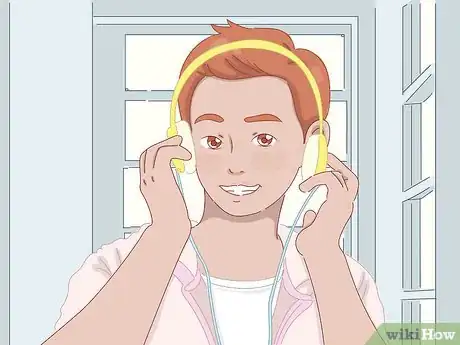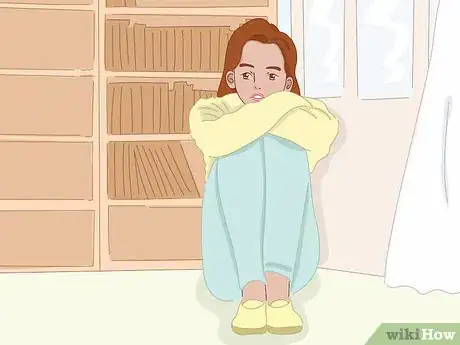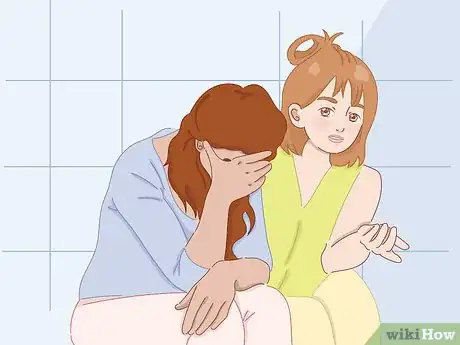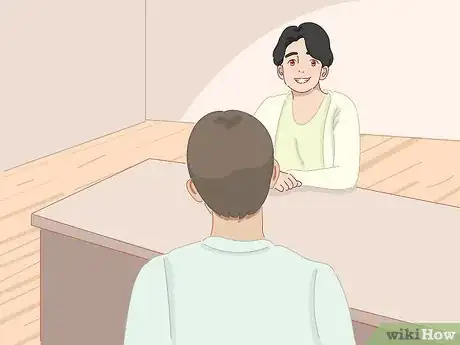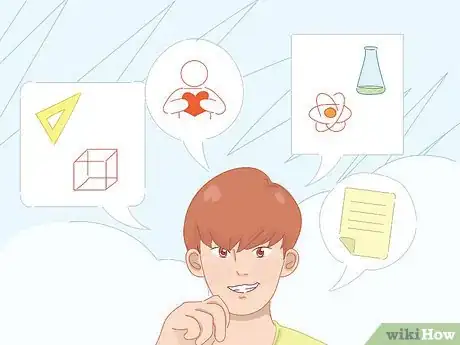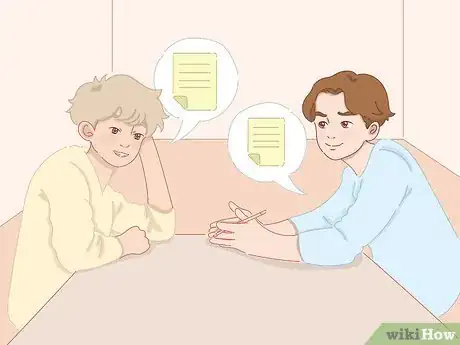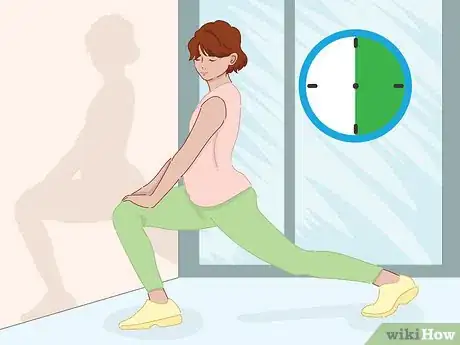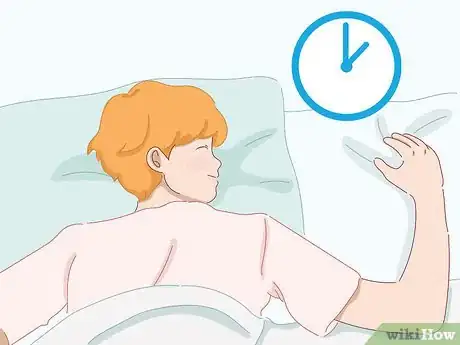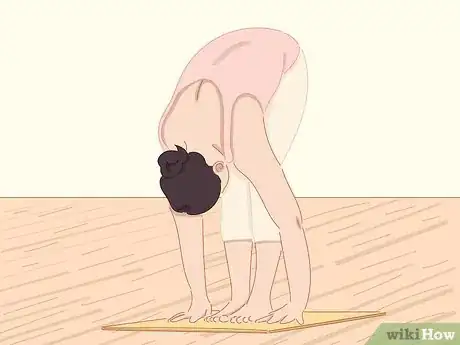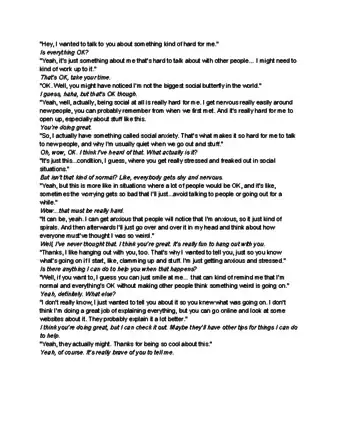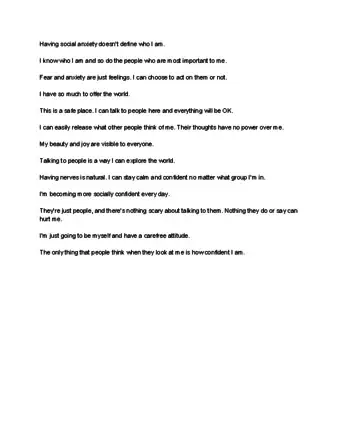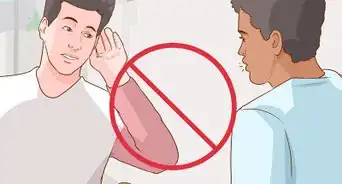This article was co-authored by Cameron Gibson, R.C.C.. Cameron Gibson is a Registered Clinical Counsellor in Vancouver, British Columbia. Cameron specializes in working with men to support their struggles with anxiety, depression, trauma, OCD, and developmental disabilities. He holds a BA in Psychology from Carleton University and an MA in Counseling Psychology from the City University of Seattle. Cameron is also the Program Director for Manifest Wellness, a men's mental health clinic, where he works to destigmatize mental health support for men and increase access to counseling.
There are 15 references cited in this article, which can be found at the bottom of the page.
This article has been viewed 24,437 times.
It's normal for teenagers to feel self-conscious, but if self-consciousness prevents you from speaking up in class or making friends in high school, you may have a common condition known as social anxiety disorder. To overcome this condition, you'll need to work with a professional, like a school counselor. You may also benefit from reaching out to people you trust and making positive lifestyle changes that support your health.
Steps
Managing Day-to-Day Life
-
1Practice deep breathing to ease anxiety. If anxiety hits before a presentation or right before the bell rings to change, take a few deep, cleansing breaths to calm down.[1] Pull in the breath through your nose for about 4 counts, hold it briefly, then exhale through pursed lips for 8 counts.[2]
- Deep breathing is a handy tool you can use anytime or anywhere to get a handle on your anxiety.
-
2Listen to music to calm yourself. If your school allows headphones when you're not in class, try listening to some of your favorite tunes in between classes or during lunch. This can help you to tune out others when you're feeling anxious and reconnect with something positive like good music.[3]
- If your school doesn't allow headphones, you may be able to get special accommodations to use them. Ask your parents or school counselor for help.
Advertisement -
3Find a safe place to catch your breath. If you're overwhelmed at school, try going to the library or an empty classroom. Here, you can take a couple deep breaths to calm yourself down, listen to music, or write in a journal.[4]
- Check with your school counselor to get permission and establish set times when you are free to use this space.
-
4Try to make eye contact and smile at people. Making casual conversation with other kids at school may seem intimidating, so start by trying to present yourself as approachable. Briefly making eye contact and flashing a smile helps you seem cool, so they may come up and talk to you without you having to initiate things.[5] [6]
- Even if your smile doesn't make people talk to you, it will still help you come off as more relaxed and friendly. Plus, you'll likely feel happier, too.
-
5Channel your anxiety into a creative activity. Sign up for band, drama, or art. These activities not only bring about positive self-worth, but they'll also temporarily distract you from your worries. What's more, creative activities also allow you to release anxiety and turn it into something special, like a song or a painting.[7]
-
6Focus on the task at hand using mindfulness. Anxiety can have your brain speeding into the future, but mindfulness helps return you to the here and now. Whenever you are doing an activity, try to focus on it fully, without allowing competing thoughts to distract you.[8]
- For example, if you are doing math problems, give them your full attention. Notice each number and reflect on the relevant formulas. If your mind starts to wander, take a deep breath and return to the task at hand.
-
7Make a list of the situations where your anxiety spikes. Understanding what triggers your social anxiety can make it easier to manage and prepare for. Think about which circumstances or settings tend to bring your anxiety out the most, and write them down.
- For example, perhaps you feel most anxious when you are around large crowds or in social situations that are unstructured or unfamiliar.
-
8Relabel your anxiety into excitement. Calling it “anxiety" sometimes makes it feel unbearable, so try giving it a different name. This can help reduce the stress you feel and reshape your perspective about the situation.[9]
- For instance, if anxiety strikes before a group presentation, tell yourself, “I sure am excited to do this presentation. I'm prepared and I've practiced, so I know I'll do well.”
Getting Support
-
1Talk to your parents or guardian(s) about your social anxiety. You'll need some people in your corner to overcome social anxiety, so why not turn to your parents? Share your thoughts and feelings regarding social anxiety with your parents. Ask them for support or encouragement in overcoming the condition.[10]
- You might say, "Mom, I think I have social anxiety. I get really nervous when the teacher calls on me in class.”
- If your parents/guardian(s) react negatively, you might ask them to contact the school counselor. Having a conversation with a professional may help educate them on social anxiety and offer them useful advice on how to help you cope.
- Go into the discussion with a little info about social anxiety, just in case your parents/guardian(s) don't know about it. Try printing out some information on the condition or ask your counselor for a pamphlet.
-
2Confide in trusted peers and ask for their help. If you have friends or siblings your age, consider talking to them about social anxiety. Share some of your fears and ask them for support. If you have an idea as to how they can help, make a suggestion.[11]
- For example, you might ask your sibling if it's okay to sit with them at lunch so you're not eating alone. You might ask a friend if they can introduce you to others so that you can expand your social circle.
-
3Participate in a support group. Support groups are great ways to make friends, get encouragement, and receive practical advice for dealing with anxiety. Plus, having people who are empathetic about your situation can help you feel less alone in dealing with it. Look up support groups for social anxiety in teens online or in your local community and go to a meeting.[12]
- If you're nervous at the meeting, you don't have to say anything beyond making introductions. Just give it a try and see how you like it.
-
4Diversify your social circles. Is there one area in which your social anxiety is especially bad? If so, try making friends in other areas.[13]
- For instance, if you really like chemistry lab, you might not feel much anxiety there. Try striking up a conversation with your lab partner. This may feel like less pressure than making a friend at lunch.
- You might also try making friends online to boost your confidence in making friends in real life. Just be sure to follow safe practices.
Working with a Therapist
-
1Talk to a therapist or school counselor. Dealing with social anxiety in high school can be really overwhelming, so reach out for professional help. To start things off, try making an appointment with your school counselor. That way, you'll have at least one person to confide in about what you're going through.[14]
- In your appointment, be sure to thoroughly explain what's happening with you. Tell your counselor how much your social anxiety is affecting your school and social activities.
- Your school counselor may be able to treat your social anxiety or they may refer you to a therapist in your community who can help.
-
2Identify and challenge thinking patterns that trigger anxiety. Working with a counselor, try to spot negative thought patterns that make you feel anxious. After identifying thought patterns that make your anxiety worse, try to challenge them. Doing this can take away the power of the negative thought.[15]
- For example, at the possibility of being called on in class, you might think "I'm going to make a fool of myself." To challenge these thoughts, think of times when you have successfully spoken in class.
-
3Learn basic social skills to feel more comfortable interacting. Create scenarios with your therapist that mimic typical social situations. Then, practice engaging as if it was a real situation.[16]
- Good scenarios to practice might include answering a question in class (or politely saying you don't know the answer), saying hello to a classmate, or inviting a friend to hang out.
- This can help you get used to certain social situations and build confidence in your social skills.
-
4Practice exposing yourself to fearsome situations gradually. Sit down with your therapist and create a list of the situations that cause anxiety. Make a plan to expose yourself to these situations, starting with those that cause the least anxiety.[17]
- For example, you might start exposing yourself to eating in common areas at school. First, you might eat alone outside. Then, inside at a faraway table. Finally, you might work your way up to sitting at a table with others.
-
5Talk to your therapist about medication. If you’ve been working with a therapist for a while and feel that your social anxiety is not improving, you might benefit from anxiety-reducing medications. Your therapist can refer you to a physician or psychiatrist who can help you find the right medication.
Taking Care of Yourself
-
1Eat right to combat anxiety. Work to treat your anxiety from within by eating foods high in zinc, magnesium, and omega-3 fatty acids. These include fresh fruits and leafy green vegetables, whole grains, beans, nuts and seeds, and fatty fish like salmon or tuna.[18]
- Steer clear of sugary and processed foods, as well as caffeinated beverages that can actually worsen your anxiety.
-
2Aim for 30 minutes exercise each day. Physical activity can serve to help you "blow off steam" before or after classes each day. Exercise also stimulates the production of feel-good chemicals called endorphins that lift your spirits.[19]
- Exercise at least 30 minutes a day with activities like running, swimming, hiking, dancing, or weight-lifting.
-
3Sleep at least 8 hours per night. Being sleep deprived can exacerbate anxiety symptoms and leave you feeling wired or jittery. Start a new bedtime routine of winding down each night 1 to 2 hours beforehand. Do relaxing activities like reading a book, taking a bath, or engaging in gentle stretching.[20]
- Commit to going to bed and waking up at the same times each day to create a consistent schedule. After a few weeks, you might notice that your anxiety isn't as bad as it used to be.
-
4Create a stress-management routine to keep anxiety in control. A high-stress life can make you feel lower in confidence and more negative about your abilities. Battle stress by practicing relaxation techniques and adopting a self-care plan.[21]
- Relaxation exercises like yoga, progressive muscle relaxation, and meditation can help you overcome problems with anxiety.
- Regular self-care can help you feel more confident and even boost your spirits. Try pampering yourself with a massage, a mani-pedi, a new haircut, or a cool new journal to write in.
-
5Avoid the use alcohol or drugs. If you have been using drugs and alcohol to cope with your anxiety, talk to your counselor and/or parents and figure out a plan to stop. Instead of numbing your emotions with substances, try talking to a trusted friend about what you're feeling or getting some exercise to boost your mood.[22]
- Some teens try to fight anxiety with alcohol or drugs. In the long run, these substances only worsen anxiety. Plus, they may make it harder for you to keep up with school work and maintain social relationships.
Conversation Help for Social Anxiety
Expert Q&A
-
QuestionHow do you center yourself when you're anxious?
 Cameron Gibson, R.C.C.Cameron Gibson is a Registered Clinical Counsellor in Vancouver, British Columbia. Cameron specializes in working with men to support their struggles with anxiety, depression, trauma, OCD, and developmental disabilities. He holds a BA in Psychology from Carleton University and an MA in Counseling Psychology from the City University of Seattle. Cameron is also the Program Director for Manifest Wellness, a men's mental health clinic, where he works to destigmatize mental health support for men and increase access to counseling.
Cameron Gibson, R.C.C.Cameron Gibson is a Registered Clinical Counsellor in Vancouver, British Columbia. Cameron specializes in working with men to support their struggles with anxiety, depression, trauma, OCD, and developmental disabilities. He holds a BA in Psychology from Carleton University and an MA in Counseling Psychology from the City University of Seattle. Cameron is also the Program Director for Manifest Wellness, a men's mental health clinic, where he works to destigmatize mental health support for men and increase access to counseling.
Registered Clinical Counsellor & Program Director You can try keeping a small object in your pocket and gently rub your fingers over it to recenter yourself when you're anxious.
You can try keeping a small object in your pocket and gently rub your fingers over it to recenter yourself when you're anxious. -
QuestionHow can I combat anxiety?
 Cameron Gibson, R.C.C.Cameron Gibson is a Registered Clinical Counsellor in Vancouver, British Columbia. Cameron specializes in working with men to support their struggles with anxiety, depression, trauma, OCD, and developmental disabilities. He holds a BA in Psychology from Carleton University and an MA in Counseling Psychology from the City University of Seattle. Cameron is also the Program Director for Manifest Wellness, a men's mental health clinic, where he works to destigmatize mental health support for men and increase access to counseling.
Cameron Gibson, R.C.C.Cameron Gibson is a Registered Clinical Counsellor in Vancouver, British Columbia. Cameron specializes in working with men to support their struggles with anxiety, depression, trauma, OCD, and developmental disabilities. He holds a BA in Psychology from Carleton University and an MA in Counseling Psychology from the City University of Seattle. Cameron is also the Program Director for Manifest Wellness, a men's mental health clinic, where he works to destigmatize mental health support for men and increase access to counseling.
Registered Clinical Counsellor & Program Director Try taking a few deep breaths to calm down and refocus so you don't feel as anxious.
Try taking a few deep breaths to calm down and refocus so you don't feel as anxious. -
QuestionHow can I help my daughter with social anxiety?
 Klare Heston, LCSWKlare Heston is a Licensed Independent Clinical Social Worker based in Cleveland, Ohio. With experience in academic counseling and clinical supervision, Klare received her Master of Social Work from the Virginia Commonwealth University in 1983. She also holds a 2-Year Post-Graduate Certificate from the Gestalt Institute of Cleveland, as well as certification in Family Therapy, Supervision, Mediation, and Trauma Recovery and Treatment (EMDR).
Klare Heston, LCSWKlare Heston is a Licensed Independent Clinical Social Worker based in Cleveland, Ohio. With experience in academic counseling and clinical supervision, Klare received her Master of Social Work from the Virginia Commonwealth University in 1983. She also holds a 2-Year Post-Graduate Certificate from the Gestalt Institute of Cleveland, as well as certification in Family Therapy, Supervision, Mediation, and Trauma Recovery and Treatment (EMDR).
Licensed Social Worker Once she admits it to you, then the door is open to further communication and possible strategies. Initially, do a lot of listening. Don't try to talk her out of the social anxiety; don't minimize it. It is very real for her. You can offer her the possibility of counseling that she can attend without you.
Once she admits it to you, then the door is open to further communication and possible strategies. Initially, do a lot of listening. Don't try to talk her out of the social anxiety; don't minimize it. It is very real for her. You can offer her the possibility of counseling that she can attend without you.
References
- ↑ Cameron Gibson, R.C.C.. Registered Clinical Counsellor & Program Director. Expert Interview. 10 February 2021.
- ↑ https://www.psychologytoday.com/blog/in-practice/201607/breathing-techniques-anxiety
- ↑ https://www.calmclinic.com/anxiety/how-to-cure-social-anxiety
- ↑ https://www.psychologytoday.com/blog/high-octane-women/201201/6-reasons-you-should-spend-more-time-alone
- ↑ Cameron Gibson, R.C.C.. Registered Clinical Counsellor & Program Director. Expert Interview. 10 February 2021.
- ↑ https://www.anxietybc.com/self-help/effective-communication-improving-your-social-skills
- ↑ https://www.psychologytoday.com/blog/hollywood-the-couch/201209/turning-anxiety-creativity
- ↑ https://www.psychologytoday.com/blog/shyness-is-nice/201305/must-have-coping-strategies-social-anxiety
- ↑ https://www.psychologytoday.com/blog/shyness-is-nice/201305/must-have-coping-strategies-social-anxiety
- ↑ https://themighty.com/2017/09/high-school-social-anxiety-advice/
- ↑ https://themighty.com/2017/09/high-school-social-anxiety-advice/
- ↑ https://www.nhs.uk/conditions/social-anxiety/
- ↑ https://www.calmclinic.com/social-anxiety/student-school-life
- ↑ https://www.calmclinic.com/social-anxiety/student-school-life
- ↑ https://psychcentral.com/lib/6-ways-to-overcome-social-anxiety/
- ↑ https://www.calmclinic.com/social-anxiety/student-school-life
- ↑ https://psychcentral.com/lib/6-ways-to-overcome-social-anxiety/
- ↑ https://www.health.harvard.edu/blog/nutritional-strategies-to-ease-anxiety-201604139441
- ↑ https://adaa.org/living-with-anxiety/managing-anxiety/exercise-stress-and-anxiety
- ↑ https://www.helpguide.org/articles/anxiety/social-anxiety-disorder.htm
- ↑ https://www.helpguide.org/articles/anxiety/social-anxiety-disorder.htm
- ↑ https://adaa.org/understanding-anxiety/social-anxiety-disorder/social-anxiety-and-alcohol-abuse


